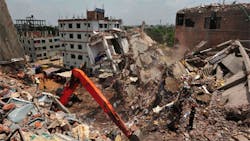DHAKA -- A top investigator probing last week's garment factory disaster in Bangladesh on Friday blamed vibrations from four illegal generators for the collapse of the building which killed more than 500 workers.
The preliminary findings of the government probe, as described by lead investigator Main Uddin Khandaker, gave the clearest explanation yet for the catastrophic structural failure.
"Four huge generators were set up on each of the top floors where garment factories were located, violating rules," Khandaker, a senior home ministry official, told AFP.
"When these generators were started after a power cut they created vibration, and together with the vibration of thousands of sewing machines, they triggered the collapse," he said.
"Within five minutes the building caved in and sandwiched into one floor like a pack of cards," he said, adding a final probe report would be submitted after the conclusion of the recovery operation.
Khandaker told AFP that the building, Rana Plaza, was built "for commercial use" not for factory, and it could not withstand the vibrations because the owner used sub-standard rods, bricks and other materials to construct it.
It also emerged Friday that an engineer who had warned that the building may be unsafe before it imploded on April 24 was being questioned by police after becoming the latest person to be arrested over the disaster.
India’s Deadliest Industrial Disaster
With bulldozers clawing away at the mountain of rubble at the site, the number of bodies being recovered from the country's deadliest industrial disaster has been increasing sharply.
Captain Shakiur Rahman, an officer in a special army control room set up to coordinate the rescue operation, told AFP the "death toll now stands at 525."
Dozens more people are thought to have been buried alive after the eight-storey building collapsed in Savar, which lies around 30 kilometers (20 miles) to the northwest of the capital Dhaka.
Around 3,000 garment workers sewing clothes for Western brands were on shift at the time of the disaster in the Rana Plaza compound, which housed five different textile factories.
Spain's Mango, Britain's low-cost Primark chain and the Italian label Benetton were among the retailers who have confirmed having products made at the site, where the typical worker took home less than $40 a month.
The collapse was the latest in a series of disasters to befall the $20 billion industry, which accounts for 80% of the country's exports, and has focused attention on the clothing industry's global supply chain.
A fire at another factory compound killed 111 workers last November.
Witnesses say the latest disaster happened after bosses insisted staff remain at their work stations, even though cracks had been detected in the building.
Mitigating the Damage
In an interview with CNN, Bangladeshi Prime Minister Sheikh Hasina defended the industry's safety record, saying the recent deadly explosion at a fertilizer plant in the United States showed that no country was immune.
"Anywhere in the world, any accident can take place," she said.
Some Western fashion brands have said they are considering their future in Bangladesh and Disney has already announced it is pulling out of the country.
The prime minister insisted that "Bangladesh now is a place for good conditions for the investment" but also suggested Western firms drawn to the country by cheap labor costs could hike salaries to improve the way businesses are run.
Industry bosses are desperate to avoid others following Disney's lead and have promised to come up with credible answers to concerns raised about factory safety.
At least 12 people have been arrested over the disaster, including the owner of the Rana Plaza compound. Civil engineer Abdur Razzaq Khan was detained on Thursday night after police said he had given the building the all-clear on April 23 after inspecting the cracks.
Khan was quoted as telling one Bengali newspaper, Jugantor, on the night before the tragedy that the building was "risky" and should be the subject of "further investigation.”
His nephew Talebur Rahman, who is a fellow director of his engineering consultancy, told AFP: "We don't know why he is being made a scapegoat or why they arrested him. Did they arrest him for warning of the danger?"
Dhaka deputy police chief A.B.M Masud Hossain said investigators found that Khan had cleared the building to continue operating while also suggesting the owner seek further advice.
- Shafiq Alam, AFP
Copyright Agence France-Presse, 2013
About the Author
Agence France-Presse
Copyright Agence France-Presse, 2002-2025. AFP text, photos, graphics and logos shall not be reproduced, published, broadcast, rewritten for broadcast or publication or redistributed directly or indirectly in any medium. AFP shall not be held liable for any delays, inaccuracies, errors or omissions in any AFP content, or for any actions taken in consequence.
